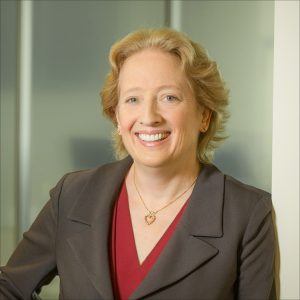 Marian Ewell, ScD ’93
Marian Ewell, ScD ’93
Senior Vice President, The Emmes Corporation
Where do you currently work and what are your job responsibilities?
After my post-doc experience at the Dana-Farber Cancer Institute, I joined The Emmes Corporation in 1994 and I’ve worked here ever since. Emmes is a contract research organization that supports clinical research, primarily for the National Institutes of Health. Over the course of two decades, I have transitioned from an individual contributor to a project leader and ultimately to an executive role.
What do you like most about your current position?
I am the Principal Investigator for the statistical and data coordinating center at the Center for Research in Infectious Diseases. We support the National Institute of Allergy and Infectious Disease’s extramural research program and contribute to the organization’s rapid response to emerging and re-emerging infectious disease threats to public health. This summer, we will be working on clinical trials to develop vaccines to prepare for a potential pandemic of H7N9 influenza. Our team is feeling energized, because for us, this is where “the rubber meets the road.” It is both a critical test of personnel, systems and processes, and it’s an important opportunity for public health impact. I have already alluded to what I like most about my current position; it’s the chance to contribute in a meaningful way to public health. I also appreciate the wonderful people with whom I work and the work-life balance that has made it possible for me to advance my career and support my family. I’m thankful that I get to experience a sense of newness and continuing challenges as my role at the company has evolved.
Why did you choose to study biostatistics and what led you to Harvard?
I was working as a master’s level statistician at the US Census Bureau, conducting research on seasonal adjustment of economic time series. Several colleagues suggested that I return to school to get a PhD in biostatistics and that I apply for the newly minted Gertrude Cox Scholarship. After researching the reputation and quality of biostatistics departments at a number of universities throughout the country, I decided to apply to the Harvard School of Public Health Department of Biostatistics.
What was the most rewarding part of your degree program?
The opportunity to apply statistics to public health motivated me more than working with economic time series data. In fact, it was that early introduction to public health that influenced my career decisions and brought me to the company where I now work – The Emmes Corporation. My favorite classes included Inference, Probability, Survival Analysis, Sequential Methods, and anything taught by Butch Tsiatis. Some of my relationships with classmates have carried over to my working career (e.g., Shelly Carter) or developed into life-long friendships (Alicia Shekter, née Toledano). My best memories are working at the Dana-Farber Cancer Institute as a research assistant and later in the post-doc program. For me, the chance to work in clinical trials gave meaning to what had largely been an academic exercise, although a highly enjoyable one.
What was the most challenging part of your degree program?
I think that the most challenging part of the degree program was recognizing that it was a marathon and not a sprint. Initially, I was discouraged when I learned that I couldn’t get transfer credit and would need to retake the courses I’d taken for my master’s degree. I remember struggling on portions of the written qualifying exam following a panicked, sleepless night. Overall, I had a lot of fun with the coursework, which I found challenging but not too difficult. If I have any regrets, it is that as a student living at home and commuting to school, I did not participate as fully in the social experience as I might have. However, living at home allowed me to help my mother, who had just had her first hip replacement, and it was the right decision for my family and me at the time.
How did your experience at Harvard prepare you for your career?
Watching professors Marvin Zelen, Dave Harrington, Steve Lagakos and others work with clinical investigators gave me an appreciation for how biostatisticians could be valued and respected as scientific partners and not just “number crunchers.” It also was valuable to observe the women who were leaders in the HSPH faculty, like Nan Laird and Louise Ryan. My male mentors were instrumental as well, and my professors Dave Wypij and Jamie Robbins gave me valuable advice. I remember taking a tour of the ECOG data coordinating center and meeting Eleanor McFadden, who gave me an appreciation of the value of coordinating center operations. The ECOG data management handbook she gave me has had a valued place on my bookshelf for two decades – a visible reminder that good statistics does not trump bad data. When I took my minor in Respiratory Physiology, I viewed it as a speed bump on my road to graduation, and was embarrassed that I didn’t know all of the answers in class. After graduation, I learned how important it is to admit what you don’t know and to keep learning from people outside of your own narrow areas of expertise.
What advice would you give to current or prospective students?
Take advantage of opportunities outside of the classroom! There is lot to be learned by participating in research projects and meeting other faculty and students. Also, be open to new options and opportunities, and keep learning new things.



